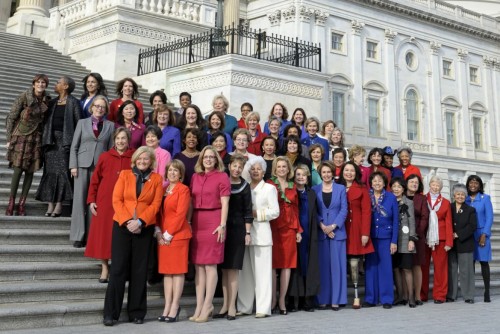To conduct their study, the researchers varied the gender composition of a hypothetical bipartisan legislative committee and the decision it made about a policy impacting women`s rights.
The legislative committee was either all male or gender-balanced, and the choice on the docket was either to increase or decrease penalties for workplace sexual harassment. Since the victims of workplace harassment are overwhelmingly female, a decision to increase penalties signified a positive impact for women, while the decision to decrease the penalties would signify a negative impact.
The presence of women legitimizes legislative decisions
For each of the four possible conditions, the survey respondents were asked whether the decision was right for all citizens, whether it was right for women specifically and how fair it was to women.
They found that the public was substantially more likely to perceive a decision negatively impacting women as fair when it was made by a gender balanced committee than when the same decision was made by an all-male committee. The gender composition had no effect on what people thought about the fairness of the decision when it positively impacted women.
While the presence of women in the committee was more likely to increase the perceived legitimacy of the antifeminist decision for everyone, the effect was twice as strong for men.
"This effect may be particularly strong for men because they have less certain opinions about the issue of sexual harassment, and thus may be more easily persuaded by women`s presence," said Clayton. "Women, on the other hand, are more likely to have strong pre-existing feelings about the issue."
To test that question, the researchers asked the respondents how serious of a problem they thought sexual harassment was. Seventy-five percent of women rated it very serious, compared to just 55 percent of men. This suggests that the more certain someone`s opinion is about the subject, the less likely they are to be swayed by the gender composition of the committee.
The presence of women legitimizes the decision-making process
Next, the survey respondents were asked questions to assess their feelings about the legitimacy of the deliberative process—not the outcome. Respondents were asked to rate their impression of the fairness of the process and how much they trusted the committee to make fair decisions. In this case, gender balance substantially increased the perception of procedural legitimacy, though much more when the panel reached an antifeminist decision.
Because sexual harassment is a much more salient concern for women than men, the researchers then ran the same experiment again, but this time replaced sexual harassment with animal mistreatment as the subject of debate. This time, the gender composition of the panel had no bearing on the public`s perception of the fairness of the outcome, but it did substantially change how they perceived the process. Again, the public had much more confidence in a gender-balanced committee than an all-male one.
"Americans strongly prefer inclusion," said Clayton. "Including women in political decision-making improves the public perception that political decisions are legitimate and that political institutions are working fairly."
Everyone wants women to be in the room when decisions are made
Looking at the demographics of their respondents, the researchers found that both Democrats and Republicans had more faith in the gender-balanced committee than all-male one—although to varying degrees. (Republicans are more likely to rate an antifeminist decision made by a gender-balanced panel as fair than Democrats are.) It even held true when respondents were not asked to explicitly consider the gender balance of the committee when making their assessments, but rather were simply shown photos of the hypothetical committee members. Additionally, it held true both immediately after the 2016 election, when gender was a particularly salient topic of public debate, and a year later—before the #metoo movement began.
"In future research, we`re interested in exploring how messages of women`s inclusion or exclusion in political decision-making compel citizens, both men and women, to become more involved in the political process, including the decision to run for office," Clayton said.

The presence of women in a decision-making body increases the public`s perception of that body`s legitimacy, especially when that group makes decisions that impact women. This is one of the key findings of "All Male Panels? Representation and Democratic Legitimacy," by Amanda Clayton, assistant professor of political science at Vanderbilt University, and her co-investigators, Jennifer Piscopo, assistant professor of politics at Occidental College, and Diana O`Brien, associate professor of political science at Texas AM University, appearing soon in the American Journal of Political Science.




